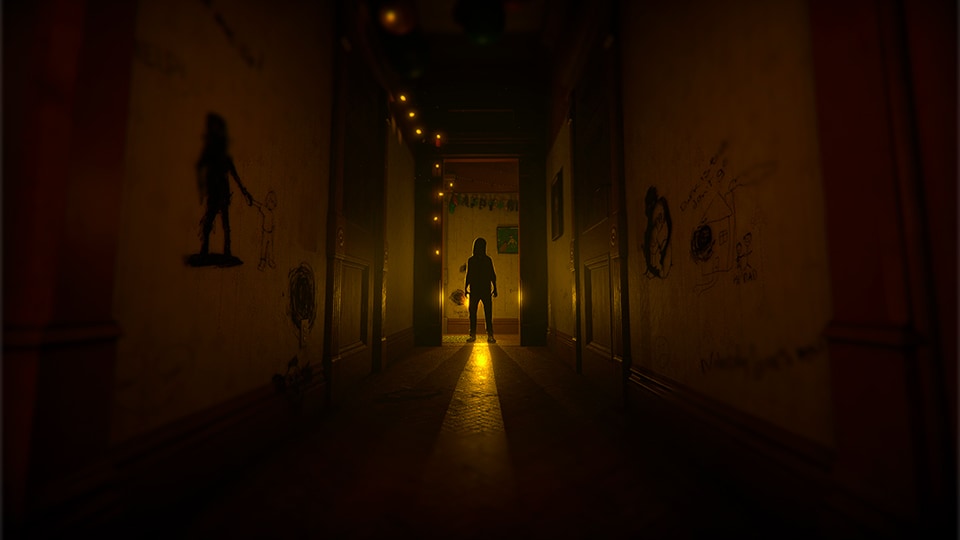Transference is, at its core, a psychological thriller. Co-created by Ubisoft and SpectreVision, a production company co-founded by Elijah Wood, it invites players to explore the fractured minds of a family trapped in a simulation. As you do, you'll be confronted with sudden scares, uncover disturbing memories, and experience the creeping dread that something terrifying might be edging closer while you're noisily rummaging through drawers and cabinets for clues. Transference wants to evoke more than fear, though; it also wants to create moments where fear turns to empathy, and harness that empathy to drive you to solve its mysteries.
Designed from the ground up for virtual reality but playable without it, Transference tells the story of the Hayes family, whose patriarch – scientist Raymond Hayes – was driven by obsession to bring their minds into a simulation, in an attempt to make them immortal. Something went wrong, however, and now Raymond, his wife, and his son are trapped in fractured realities, tormented by digital nightmares and their own terrifying memories. Playing as yourself, you'll venture into the simulation in an attempt to set things right.
We began the demo at E3 2018 (which we played entirely in VR, with Oculus Touch controllers) standing in the dingy stairwell of an apartment building. A notice on a nearby bulletin board proclaimed there was something wrong with the lights, which is a huge clue; hitting a light switch in Transference will shift to a different reality, and a different version of your surroundings, and exploring these is the key to solving many of the game's puzzles.

Touching a light switch shifted our current surroundings almost imperceptibly, except for one new addition: someone was banging on a door somewhere below us. Following the sound led us down to the basement, an appropriately creepy, narrow space where we found a ghostly knocker flailing away by itself, hovering just in front of a locked door. When we touched it, the knocking immediately ceased, and we saw that it was for Apartment C, several floors above us. Once we'd found our way up there, Apartment C was missing its door; in its place was a black void and a placeholder rectangle generated by the simulation. Touching the switch again brought us back to a reality where the door existed, and attaching it let us enter the darkened apartment.
Almost immediately after entering, we turned a corner and froze – a dark figure stood at the end of a hallway. This, however, was one of those fear-to-empathy moments, because after the initial surprise wore off, we realized it was just a little boy. (Not a creepy one, either.) This was Benjamin, Raymond's son, and as we took a step he fled, clearly panicked, and shut himself in one of the adjacent rooms. For now, there was nothing to do but explore, and hitting another light switch brought us to a well-lit but completely empty version of the apartment, in which we could open doors that were previously locked.

Transference is full of things to open, pick up, and interact with, usually indicated by their flickering presence in the world. Some of these things are seemingly commonplace, like a box of puppy treats under a sink, while others tell you something more specific about the characters you're investigating – a student recorder flute discarded on a chair near some concert tickets, for example, or a flyer advertising the grand opening of the family's music store in 2010. Some of the objects are key to solving Transference's puzzles; where most items can be dropped to the floor and will eventually reappear in their original places, key items tend to hang in space when you let go.
That was the case with a crystal we found in a previously inaccessible back room, which fit neatly into a radio nearby. Revisiting the more ominous, lived-in version of the apartment, we ventured into the hallway where we'd seen the kid, and heard his voice coming from a door (adorned with a sign asking for a password), seemingly calling to his dad on a radio.

After searching the rest of the place fruitlessly for a password, we ventured into the kitchen, which was ravaged by the simulation; patches of the walls looked like they'd been eaten away by a black void, while a door to another room was gone entirely; like the front door, it was marked only by a large rectangle declaring the asset to be missing. Hitting the light switch brought us to a more intact version of the room (with the door now in place, but locked), and we started rifling through the drawers, finding kitchen implements but no keys.
The solution, instead, turned out to be the radio; by turning the dial, we were eventually able to lock into Benjamin's frequency and hear him more clearly. He was desperate, calling out to his dad for help. There was something in there with him. He abruptly cut off the call.

Switching back to the other reality, we turned the radio dial to the same frequency and heard Raymond calling out to his son. Now that we were back in the same version of the apartment as Benjamin, maybe we could do something – but as we stepped back out in the hallway, a black thing oozed out of the walls. A moving, humanoid version of the all-consuming void, it drew itself up to its full height, filling the hallway, and opened two glowing eyes. Then it lunged, filling our view with darkness and abruptly ending the demo.
We'll get a more complete view of what's happened to the Hayes family when Transference arrives this fall on PS4, PC, and Xbox One, with full support for PSVR as well as Oculus Rift and HTC Vive on PC. In the meantime, find out more by checking out our previous coverage.



